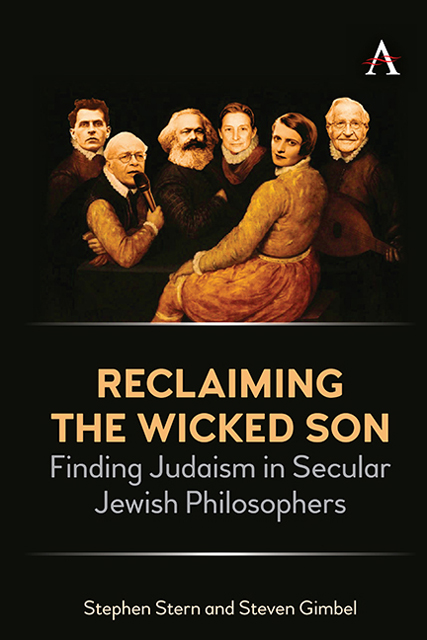Book contents
- Frontmatter
- Dedication
- Contents
- Introduction: Reclaiming the Wicked Son
- 1 Karl Marx and Materialistic Messianism
- 2 Ludwig Wittgenstein and Neo-Talmudic Thought
- 3 Ayn Rand and the Hassidic Courts
- 4 Peter Singer: The Amos of Anim
- 5 Judith Butler and Orthopraxy
- 6 Noam Chomsky, Kabbalist
- Conclusion: Re-Membering the Tribe
- Bibliography
- Index
Introduction: Reclaiming the Wicked Son
Published online by Cambridge University Press: 10 January 2023
- Frontmatter
- Dedication
- Contents
- Introduction: Reclaiming the Wicked Son
- 1 Karl Marx and Materialistic Messianism
- 2 Ludwig Wittgenstein and Neo-Talmudic Thought
- 3 Ayn Rand and the Hassidic Courts
- 4 Peter Singer: The Amos of Anim
- 5 Judith Butler and Orthopraxy
- 6 Noam Chomsky, Kabbalist
- Conclusion: Re-Membering the Tribe
- Bibliography
- Index
Summary
The writers of the Passover Haggadah brought together four passages from disparate portions of the Torah to frame the allegory of the four sons:
The Torah describes four children who ask questions about the Exodus. Tradition teaches that these verses refer to four different types of chil dren. The wise child asks, “What are the laws that God has com-manded us?” The parent should answer by instructing the child in the laws of Passover, starting from the beginning and ending with the laws of the Afikomen. The wicked child asks, “What does this Passover ser vice mean to you?” The parent should answer, “It is because of what God did for me when I came out of Egypt. Specifically ‘me’ and not ‘you.’ If you had been there (with your attitude), you couldn't have been redeemed” The simple child asks, “What is this Seder service?” The parent should answer, “With a mighty hand God brought us out of Egypt. Therefore, we commemorate that event tonight through this Seder.” And then there is child who does not know how to ask. The parent should begin a discussion with that child based on the verse: “And you shall tell your child on that day, ‘We commemorate Passover tonight because of what God did for us when we went out of Egypt’” (Schneerson, 9)
We can appropriate this passage for another use. The story of the four sons illustrates the four tasks of Jewish Studies.
The wise son's question represents Jewish Studies scholars hashing out matters related to Jewish law, Jewish custom, Jewish history and Jewish thought among themselves. This son is wise because he is one of the learned scholars discussing Jewish matters at a high level with other learned scholars. Like any proud Jewish family, we love to put our wise children in front of company. One can find Ruth Wisse, for example, not only on the pages of prestigious academic journals, but on radio and television. Jacques Derrida made no secret of the Talmudic influence on his deconstructive methodol ogy which spread to secular philosophy, literary theory and throughout the social sciences. The wise siblings own their Jewishness and it informs their questioning.
- Type
- Chapter
- Information
- Reclaiming the Wicked SonFinding Judaism in Secular Jewish Philosophers, pp. 1 - 4Publisher: Anthem PressPrint publication year: 2022



